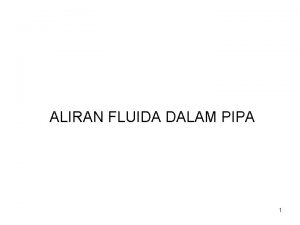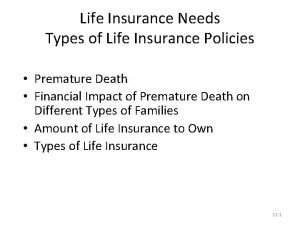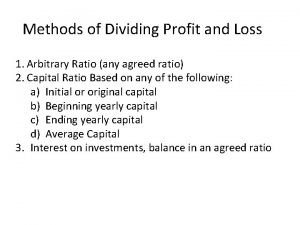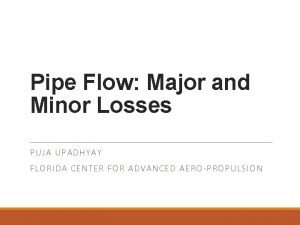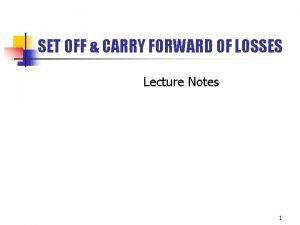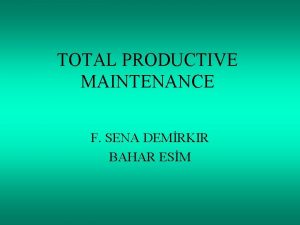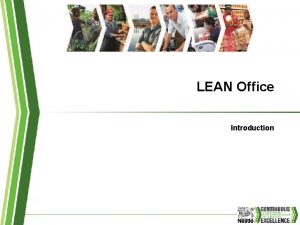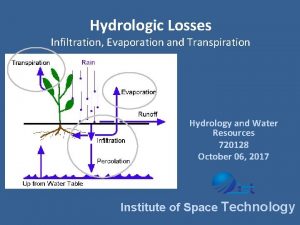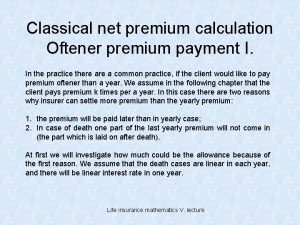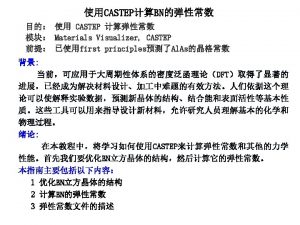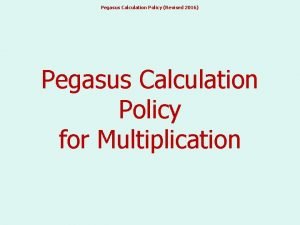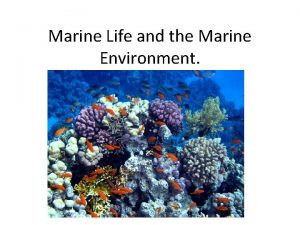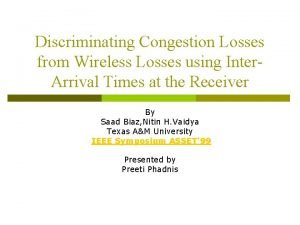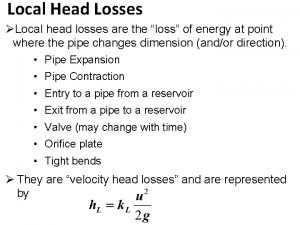QUE policy conditions premium calculation and marine losses
















- Slides: 16


QUE: policy conditions, premium calculation and marine losses

MARINE INSURANCE � Marine insurance covers the loss or damage of ships, cargo, terminals, and any transport or cargo by which property is transferred, acquired, or held between the points of origin and final destination. Cargo insurance — discussed here — is a sub-branch of marine insurance, though Marine also includes Onshore and Offshore exposed property, (container terminals, ports, oil platforms, pipelines), Hull, Marine Casualty, and Marine Liability. When goods are transported by mail or courier, shipping insurance is used instead.

� There are several types of marine perils may arise at the time of voyage in the sea. Marine perils may be said that marine losses are happened due to natural and in natural marine perils. � Marine losses are classified into two parts. Such as� A. Total loss � B. Partial loss � 1. Total loss: It the ship or goods are fully or constructively damaged then the loss is called total loss. This loss is of two types. � A. Actual Total loss: When the element of insurance that is ship, goods, compensation is fully destroyed and if there is no part of the insured subject left then the loss is called actual total loss. The following are treated as actual total loss

i. If the ship breaks into pieces. � ii. If the ship totally sinks into deeps of the sea. � iii. If the goods sink into the sea in such way that they cannot be searched; � iv. If the goods destroy in such way that they turn into other thing. If the cement becomes store or sugar or salt becomes water. � B. Constructive total loss: When the element of insurance are not fully destroyed but treated as an actual loss in the views of law, then the loss is called constructive total loss. � 2. Partial loss: If the insured goods or the element of insurance face a loss partially then the loss is treated as partial loss. These types of losses are discussed below: � a. Particular partial loss: It any of the certain insured elements faces a partial loss due to any marine perils, then that loss may be treated as particular partial loss. This type of loss is occurred by certain accidental perils. This loss is of three (3) types. �

� i. Particular partial loss of ship: If the ship destroys partially not fully due to any certain accident then the loss is called particular partial loss of ship. Here the insured can claim only for the repairing charge for the damage of the ship. � ii. Particular partial loss of goods: If the goods in a ship destroyed partially then the loss is treated as particular peril loss of goods. � iii. Particular partial loss of compensation: It the goods carried by ship are damaged partially and the shipping company or the bearer gets no compensation the loss of compensation is called particular partial loss of compensation. If the compensation is insured then the company gets the compensation otherwise gets no compensation

b. General Partial Loss: Sometimes people has to make some sacrifices by thinking logically in favor of the other parties, this sacrifice is called general partial loss. Suppose some goods of a person are thrown into the sea for rescue the ship from storm, then it will be treated as general partial loss. This type of loss is of 3 types � i. Sacrifice: Sometimes some portions of goods are thrown into the sea to rescue the ship from storm or using goods as fire woods are known as sacrifice. � ii. Compensation: To make the ship light in any risky situation, sometimes goods are transferred to the other ship and the damaged ship need to be taken to a safe place. To do so they have to pay the rescuers as reward that is called compensation. � iii. Other related expenses: Sometimes some money is to be spent due to the maintenance of goods; these expenses are treated as related expenses. �

PREMIUM CALCULATION � � The Marine Insurance Act 1906 (MIA) makes it clear in section 52 that it is the concurrent duty of the assured or his agent to pay the premium and for the insurer to issue the policy. The policy form used by most insurers states that insurers agree to fulfil their obligations “in consideration of the payment of the premium”. In reality the premium is seldom paid at the time of commencement of cover, which means that cover is granted against the promise of payment. Indeed the First Schedule to the Act gives a model policy form that uses the phrase ” confessing ourselves paid” as though acknowledging the actual unpaid state at the inception of cover. The term “Unless otherwise agreed” in section 52 allows insurers to defer the payment of premium.

� � � When a broker is involved in placing the insurance it is he and not the assured who is responsible to the insurer for the payment of premium. However the insurers are responsible directly to the assured for the payment of claims and for any return of premiums, (MIA section 53). To protect the broker from non-payment the Act allows a lien upon the policy against outstanding debt, (MIA section 53. 2). In practice premium is calculated by applying a rate percent to the sum insured. The insurer, taking into consideration all the risk aspects of the particular sending arrives at the rate %. The susceptibility of the goods for theft or damage is a major consideration as indeed is the quality of packing, the method of carriage the destination and of course the claims history. The insurers skill (some would say his second skill behind his speed and accuracy of claims settlement) is to apply a fair and reasonable rate for the risk in hand that, to his knowledge, will provide sufficient to meet the cost of claims, the expense of insuring and leave something for profit. .

� � The insurer of an Open policy has an option. Depending upon the assured’s requirements, he can charge premium at regular intervals, usually monthly. This is either in accordance with declarations/certificates received during the last 30 days, or by taking a deposit premium usually based upon the estimated annual sendings of the assured to be adjusted at the years end against a declaration of the actual value of goods at risk. The advantage of charging premium monthly is that the insurer can see at regular intervals precisely the pattern of trade and have a more up to date appreciation of the risk he is insuring. The disadvantage is that by charging monthly he is required to open his books 12 times a year in order to debit premium with the resultant expense of administration.

POLICY CONDITIONS � � Cargo insurance conditions: There are plenty of different cargo insurance conditions available, some of which are specially designed for certain commodities, such as grain, oil, timber and alike. On our site you can download most widely used conditions developed by Institute of London Underwriters (ILU). For other insurance conditions please do not hesitate to contact us. insurance. jpg. Institute Cargo Clauses (A) are standard "all risks" cargo insurance conditions developed by ILU, released in 1982 and still widely used by cargo underwriters. Alternative to "all risks" are "named perils" conditions, apparently called Institute Cargo Clauses (C), which also were developed by ILU and widely used worldwide.


� � Institute Timber Trade Federation Clauses are special ILU conditions approved by Timber Trade Federation and normally used for insurance of timber cargo. There are many other conditions available, in particular for commodity trade or shipments of oil in bulk. Please do not hesitate to contact us for full wordings or clarifications on differences between various clauses available on the market. Marine hull insurance conditions Currently there are several practises available for marine hull insurance, mainly ILU, Norwegian plan, Finnish and German. Following are some of the widely used insurance conditions.

� � � International Hull Clauses are the latest version of marine hull insurance conditions from ILU. Apparently neither brokers, nor ship owners are very much keen of this wording, but to our view these conditions are much more easier to understand all normally used additional clauses are incorporated within a single wording, which allows your policy to look a bit shorter. . . Institute Time Clauses - Hulls (1995 edition) is a bit older version, which still is of a very wide use on the market. As it always happens in Norway, they have their own insurance "Norwegian marine insurance plan" www. norwegianplan. no, which apparently is widely used around the world and easily available on the internet. Plan is designed for various types of marine insurance, including increased value and loss of hire wordings. The main benefit of the Plan is that it was designed in cooperation between underwriters and ship-owners, so it is indeed a good balanced wording.

� Finnish Marine Hull insurance conditions (FHC 2001) is quite unique wording as you may see only on two markets - naturally Finnish and sometimes (yes, the right guess) Estonian. . . Having said that we must admit that unlike London conditions FHC is all risks cover, so it gets popularity in other Baltic countries slowly, but surely. � If you wish to have complete comparison between the above wording please do not hesitate to get in touch with us for further information.

 Aliran fluida dalam pipa
Aliran fluida dalam pipa Indeterminate premium policy
Indeterminate premium policy Arbitrary ratio partnership
Arbitrary ratio partnership Friction factor for turbulent flow formula
Friction factor for turbulent flow formula Set off and carry forward of losses notes
Set off and carry forward of losses notes Tpm and tqm
Tpm and tqm Poka yoke
Poka yoke Lean office definition
Lean office definition Infiltration
Infiltration Nonrecaptured section 1231 losses
Nonrecaptured section 1231 losses In khosla's formula monthly losses is calculated as
In khosla's formula monthly losses is calculated as The bend
The bend German territorial losses
German territorial losses Losses in optical fiber
Losses in optical fiber Switching losses
Switching losses Process losses in teams
Process losses in teams Disenfranchised grief losses
Disenfranchised grief losses
